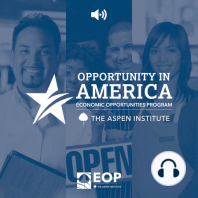97 min listen

Worker Power and the National Labor Relations Act
FromOpportunity in America - Events by the Aspen Institute Economic Opportunities Program
Worker Power and the National Labor Relations Act
FromOpportunity in America - Events by the Aspen Institute Economic Opportunities Program
ratings:
Length:
66 minutes
Released:
Mar 16, 2022
Format:
Podcast episode
Description
Over the last year, media headlines have been filled with stories of workers from various industries on strike and attempting to unionize. The roots of these efforts lie with workers in the 1800s and early 1900s who first attempted to organize and used strikes to protest low wages and poor working conditions. Those early labor movements contributed to the passage of the National Labor Relations Act (NLRA) of 1935, which gave workers the right to organize into unions and made it the official policy of the U.S. to encourage collective bargaining. Union membership surged after the passage of the NLRA and peaked at 35 percent of wage and salary workers in 1954. The NRLA had less of an impact for women and people of color, however, whose main occupations in agricultural and domestic work were deliberately excluded from the law, exclusions that still negatively affect millions of workers today. The impact of NRLA in supporting collective bargaining has also waned over time. Today, only 10 percent of wage and salary workers belong to a union including 34 percent of public employees and six percent of workers in the private sector, very low compared to most OECD countries though unionization is declining globally as well.
The future of work and job quality rests in part on workers having agency and some ability to influence their work and workplace. The NLRA provides the legal foundation for workers’ right to exercise that agency. As we look to shape the future of work, what lessons can we learn from the NLRA’s history, impact and effectiveness today?
This event includes opening remarks from the Honorable Marty Walsh (U.S. Secretary of Labor), followed by a panel discussion featuring Roy Bahat (Bloomberg Beta), Jennifer Epps (The LIFT Fund), Dr. Annelise Orleck (Dartmouth College), and moderator Charisse Jones (USA TODAY).
The Economic Opportunities Program’s Opportunity in America discussion series has moved to an all-virtual format as we all do what we can to slow the spread of COVID-19. But the conversations about the changing landscape of economic opportunity in the US and implications for individuals, families, and communities across the country remain vitally important. We hope you will participate as we bring our discussions to you in virtual formats, and we look forward to your feedback.
We are grateful to Prudential Financial, Walmart.org, the Surdna Foundation, the W. K. Kellogg Foundation, and the Mastercard Center for Inclusive Growth for their support of this series.
The future of work and job quality rests in part on workers having agency and some ability to influence their work and workplace. The NLRA provides the legal foundation for workers’ right to exercise that agency. As we look to shape the future of work, what lessons can we learn from the NLRA’s history, impact and effectiveness today?
This event includes opening remarks from the Honorable Marty Walsh (U.S. Secretary of Labor), followed by a panel discussion featuring Roy Bahat (Bloomberg Beta), Jennifer Epps (The LIFT Fund), Dr. Annelise Orleck (Dartmouth College), and moderator Charisse Jones (USA TODAY).
The Economic Opportunities Program’s Opportunity in America discussion series has moved to an all-virtual format as we all do what we can to slow the spread of COVID-19. But the conversations about the changing landscape of economic opportunity in the US and implications for individuals, families, and communities across the country remain vitally important. We hope you will participate as we bring our discussions to you in virtual formats, and we look forward to your feedback.
We are grateful to Prudential Financial, Walmart.org, the Surdna Foundation, the W. K. Kellogg Foundation, and the Mastercard Center for Inclusive Growth for their support of this series.
Released:
Mar 16, 2022
Format:
Podcast episode
Titles in the series (100)
Economic Insecurity, American Values, & the Politics of Resentment in the 2016 Election by Opportunity in America - Events by the Aspen Institute Economic Opportunities Program